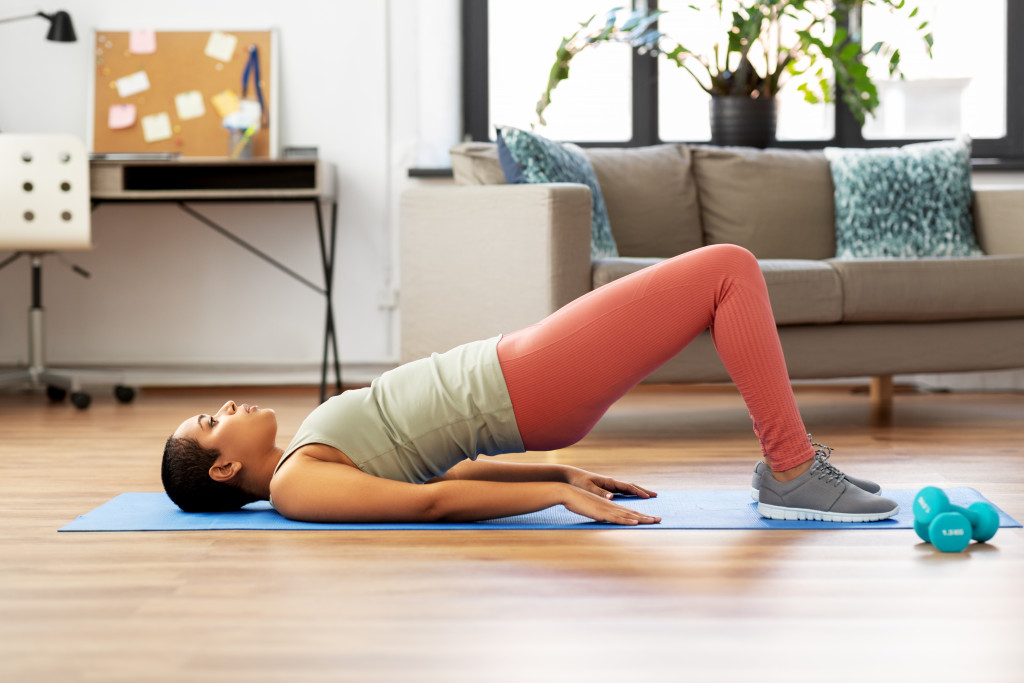Anxiety is the most common mental health disorder in the United States. According to statistics, about 18% of adults experience some form of anxiety disorder in any given year. The good news is that anxiety disorders are highly treatable, but there are many ways you can manage your anxiety, even before you seek out professional help. This post will go over tips on managing your own anxiety to live a happier, healthier life without medication or professional treatment.
Use calming breathing exercises
Breathing exercises are a great way to calm your mind and relieve stress and anxiety. It has also been shown that breathing exercises can help you sleep better, focus more effectively and even improve your overall health.
When you feel stressed or anxious, your body releases stress hormones that increase heart rate, shallow breathing, and muscle tension. These physical symptoms of stress or anxiety make it difficult for you to relax, leading to further feelings of stress or anxiety. Therefore, by using calming breathing techniques, you can reverse this effect by slowing down your heart rate while reducing muscle tension.
Try significant sleep
Getting a good night’s sleep is essential because it can help reduce anxiety symptoms and make you more productive during the day. For one week, University of Pennsylvania researchers limited the sleep time of 16 healthy young adults to 4.5 hours a night. They found that these subjects reported feeling angrier, stressed, sad, and mentally exhausted.
As a general rule of thumb, aim for 7-9 hours per night—but don’t expect to be able to hit those numbers every night. If you’re having trouble sleeping or staying asleep at least one night each week (or feel like you’re not getting enough rest), talk with your doctor about treatment options for insomnia. Some people experience significant relief from prescription medications, whereas others find that non-pharmacological approaches like exercise or mindfulness meditation work best for them. Whatever approach you try, remember that it takes time and patience to see results!
Keep active

Exercise has been shown to be one of the most effective ways to alleviate stress and anxiety. Physical activity releases endorphins, which are chemicals that create feelings of euphoria. These endorphins can also help reduce symptoms associated with depression, such as irritability and feelings of sadness.
Exercise is beneficial for many reasons, but it’s vital if you’re experiencing anxiety because it can help reduce your overall stress levels. Additionally, regular exercise will strengthen your cardiovascular system and improve blood flow throughout the body, which will aid in better sleep quality when combined with other techniques outlined in this article.
Find ways to feel connected
Feeling connected to others is vital for a healthy mind. It enhances well-being, reduces loneliness and isolation, and may even help you live longer. In fact, research has shown that socialization can be a powerful tool against anxiety.
If you feel alone or isolated from others in your day-to-day life, try finding ways to feel more connected with the surrounding people—even if it’s as simple as making eye contact with people on the subway or smiling at someone walking past in the street. The goal is not just to be friendly. Instead, it’s about breaking down barriers between yourself and others so that they become less intimidating in your eyes.
Manage your thoughts
Anxiety can be a powerful tool. It helps us detect threats and dangers, which is vital in our day-to-day functioning. But anxiety can also cause distress when it’s triggered by harmless situations or goes unchecked for too long.
One of the steps to managing your anxiety is learning how to manage your thoughts. You need to recognize when a thought pattern starts negatively affecting how you feel and act in the world around you. This may take some practice—it’s okay if this doesn’t come naturally at first!
When you notice that your mind has taken an anxious turn, two things will help: recognizing that it’s happening and practicing letting go of negative thoughts or trying something else entirely for a while (like focusing on positive ones). It’s important to remember that your thoughts are just thoughts—they’re not facts. When you start feeling anxious, try to separate the fact from the fiction: “Oh, this thought is making me feel bad right now.” This will help you stop taking everything so seriously and give you a moment of relief.
Practice self-care
Self-care is an integral part of managing your anxiety. Finding the time and energy to practice self-care when constantly worrying about things can be challenging, but it’s one of the most effective ways to help you feel better. Self-care is not selfish, nor does it mean you’re “too good” for certain activities. It’s simply a way to take care of yourself in times of stress or unhappiness, so you have more energy left over toward your goals and dreams—not just for yourself, but also for those around you who love you and depend on you.
Self-care doesn’t have to involve expensive trips or elaborate rituals. You can do many small things every day (and night) that will significantly affect how much energy you have available for work, relationships, and play! For example, try making your bed in the morning. It’s a ritual that helps you feel more organized and prepared for the day ahead. If you’ve been delaying visiting your tooth doctor, now is the time to schedule an appointment. You’ll feel better about yourself and your oral health and have more energy to focus on other things.
In Closing
As you can see, there are many ways to better manage your anxiety. The most important thing is finding what works for you and sticking with it. You may need to try different approaches before finding one that works. If one doesn’t work, move on to the next one! After all, the key is not giving up but rather working hard until you find something that helps alleviate your symptoms and reduces stress levels, so they don’t get out of hand again.

